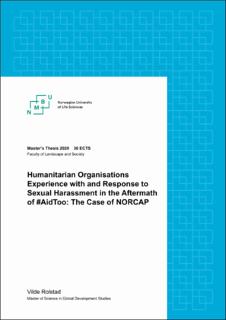| dc.description.abstract | The purpose of this thesis is to gain insight into humanitarian organisations’ experience with and response to sexual harassment in the aftermath of the #AidToo movement. This is done through a case study of a humanitarian recruitment organisation’s organisational changes, policies, procedures, and trainings by comparing this with employees’ experience and perceptions of the organisation’s preventative efforts. To do this, a qualitative study approach was chosen, involving my data being gathered through semi-structured interviews with the chosen organisations’ employees. I also reviewed a selection of the organisation’s documents regarding prevention of sexual exploitation, abuse, and sexual harassment, to be able to compare what is written in the document and the employees’ understandings.
This study found that sexual harassment still persists, even though the humanitarian organisation responded and adapted after #AidToo by making updates or establish new policies and guidelines on how to prevent and handle the issue. I also found that the managers and leaders play a major role in addressing this issue, despite their employees underlining their lack of awareness on how to actually prevent it. There is a tendency of perpetrators in the sector not being held accountable for their behaviours, as well as managers and leaders protecting their organisation and lacking sufficient investment, all in which hampers sufficient implementation of the established efforts. I also found aspects of gender and power central in this matter.
This research also found a gap between the organisation’s policies, procedures, and trainings and the employees’ perception on this matter and how it is managed. It found that sufficient training, communication, capacity building, and investment are lacking to adequately implement what is stated in the documents. The implementation of the organisation’s guidelines for the prevention of sexual exploitation and abuse and sexual harassment have therefore not been sufficiently implemented and have not reaching all the targeted members in the organisation. The findings are relevant for the organisation under study in their attempts to improve their organisational responsibility in the prevention of sexual exploitation and abuse and sexual harassment, as well as other, similar humanitarian organisations struggling to do the same. | en_US |

